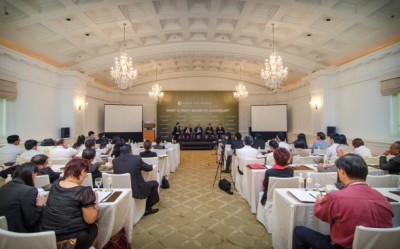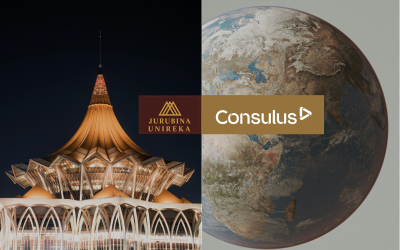Singapore (22 Oct 2012) – With corporations like Apple and Nestle holding more power than nations and religion, there is a dire need to build strong brands. As a platform for emerging Asian leaders, the conference focus on building innovative business models and strong organisations that can capture the global rise of Asia.
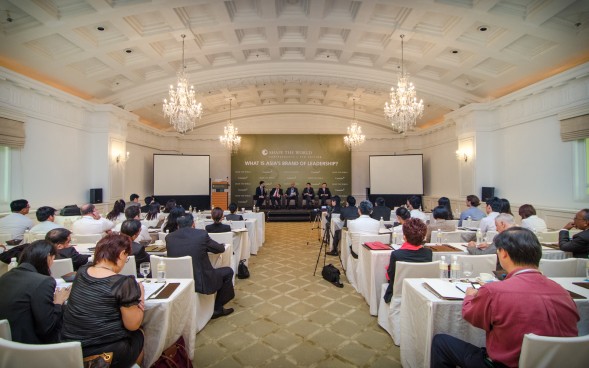
Over 70 Leaders from a wide range of industries convened at the Fullerton Hotel for this year’s Shape the World Conference
We exist in an extraordinary situation where Asia is rising. Lawrence Chong, CEO at Consulus, opened by placing this imperative to attendees: “We are facing the next tsunami of powerful western companies. If Asian companies do not embrace innovation, then they will be overrun within the next decade.”
However, Asian companies are still adopting a “cut-and-paste” attitude, pulling ideas from the West and placing them directly in Asia. Adding to that problem is the inability of Asian companies to build and sustain a brand name that can stand up along western brands while creating additional value for itself. In short, the conference sought to address need to combat the “Contractor Mentality” with the “Creator Mentality” by building unique Asian platforms and relying on ourselves for innovation.
Mr Chong proposed that the way forward was to combine business, design and technology. By merging business strategy, design company culture and utilising big data, companies can harness and grow their brands to shape the world.
Answering that call to build that Creator Mentality were three very distinct Asian leaders who built their own brands with passion and conviction that they would shape the world.
- Prof Dr M Din Syamsuddin, Chairman at Muhammadiyah, Indonesia
- Dr Low Lee Yong, Founder and CEO at MHC Asia Group, Singapore
- Mr Adrian Mok, Managing Director at Hivelocity Pte Ltd, Singapore

Dr Low Lee Yong, Founder and CEO at MHC Asia Group, described his long journey to success and how innovation was a large contributing factor to MHC Group’s strength today.
Connecting healthcare to big data
All three speakers concurred that the focus of Asian leadership in the coming years will require innovation. However, they also went a step further by explaining that a unique company culture has to be fostered before any innovation can occur from within it. In particular, Dr Low Lee Yong shared his experience of being pushed to the limits and discovering innovation in his long journey of building MHC Group.
Using big data to build actionable charts and graphs, Dr Low’s healthcare platform has linked over 1000 clinics up and processes over 1 million claims a year. His system allows for corporations to chart healthcare costs and make plans to improve their healthcare programs.
“Innovation happens during our most difficult situations. Urgency and challenges such as combating fraud drive us to build systems that can meet the problems of the company,” said Dr Low.

Prof Dr M Din Syamsuddin, Chairman at Muhammadiyah, an Islamic organisation in Indonesia with over 35 million members.
Going Global with Asian philosophy
While big data has its uses, the issue of leaders being caught off-guard by the “instant access, speed and mobility” was the leading thrust of Dr Din Syamsuddin’s speech. Dr Din rightly called Internet and Social Media technology a great equaliser because of its ability to flatten the world and nurture tectonic shifts in society, politics and economies globally.
However, he believed that the Asian philosophies and the core values that they inspire are key to a new form of Asian Leadership. He purported that our ability to maintain a cultural diversity, embrace inclusiveness and encourage harmony in an informal manner would be the key values that future leaders need to pick up. This new philosophy is due to the fact that Asian leaders can no longer continue to create “dominant narratives”. Their ideologies have to be adapted to fit with the aspirations of their followers and not the other way round.
A passionate Dr Din exhorted business leaders to embrace diversity, inclusiveness and change as the global benefit of Asia’s rise will stem from our ability to join with the countries in the West as a partner for progress.
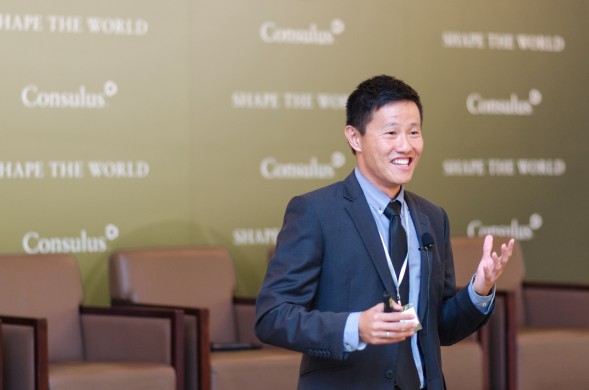
Mr Adrian Mok, Managing Director at Hivelocity, started with importing the Ironman franchise but with a clear purpose, grew to create the most iconic night marathon, Adidas Sundown Marathon.
Channeling passion with purpose
When it came to building an inclusive group culture worthy of bringing people together to achieve great things, few could be more passionate than Mr Adrian Mok. As a practising ultra marathon runner, Ironman athlete and MD of sports branding company Hivelocity, Mr Mok showed the crowd his inspiration for combining his love for endurance racing with business.
With the very clear purpose of building the largest and most iconic night marathon, Adrian sent a clear message to the world by starting the Adidas Sundown Marathon. With its brand of a truly “hardcore attitude”, he grew the marathon from just 6,000 participants to 30,000 runners in a short span of four years.
In doing so, Hivelocity was able to build an entire end-to-end process to deliver a strong customer experience by focusing on every touchpoint leading up to the race. From the moment runners see the first ads till the time they cross the finish line, Hivelocity improved every moment using traditional as well as digital feedback channels. More importantly, every tweak and change has given the brand even more attitude.
Adrian’s passion for creating a living brand shone through especially when he emphasised that “A brand needs to come alive. You have to be able to feel it through the personality.”

L-R: Mr Lawrence Chong, Prof Dr M Din Syamsuddin, Mr Idris T. Vasi, Mr Adrian Mok and Dr. Low Lee Yong
Projecting Asian culture and changing mindsets
Besides speaking on stage, the leaders were also invited to a panel discussion. This year’s panel addressed the key issue of how Asian companies could create more Asian leaders to that can innovate, and lead the market. Crucially, the panel explored how to create an organisational environment that would attract, nurture and retain leaders.
The discussion crystallised the ideas that were bring spoken upon. More specifically, the panel agreed that there are serious barriers stopping Asian companies from innovating. From platform dependencies to a lack of a risk-taking mindset, the panelists recognised that the Creator Mentality is about finding a niche that we are great at and working at it.
The group also recognised that the power of Asia lies in its ability to project soft cultural power throughout the world. While Asia does possess some semblance of hard power in its dictatorships and military history, it stands to benefit from a more romantic and gentle projection of its multiple cultures.
While touching upon culture, it was mentioned that previous generations of leaders were seperated from their followers by their assets. However, both leaders and their followers these days control the airwaves of social media and the Internet. This leads to a society that defers less to hierarchy and thus requires a corporate culture that is wildly different from that of the past.
The panel concluded that a meaningful purpose was a powerful driving force in motivating people to fight for a meaningful cause. The key is to get people to realise the purpose of their work. We have to get people to see that business is no longer “as usual” and no longer solely about earning money.
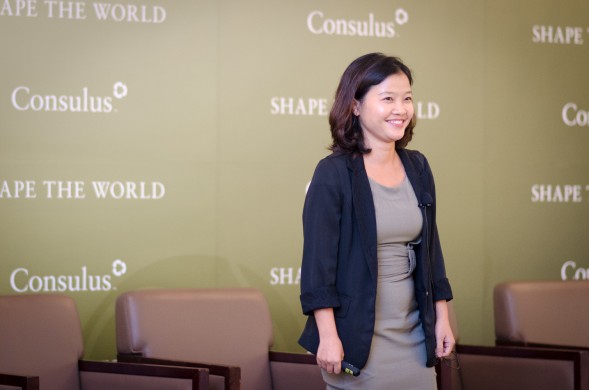
Ms Helena Pham, Senior Manager at Consulus, addresses an issue most Asian family-owned companies face: how to develop and retain leaders. Without the right leaders to continue the charge, innovation cannot happen.
A crisis of leadership
Leaders from Consulus also took the stage to give the audience practical advice on how they could lead cultural change in their own companies to enhance the business.
Helena Pham, Senior Manager for Vietnam, has built ideas and tools for corporations to develop leaders internally. What stood out for her was the urgent need for leadership renewal in Asia, especially in Asian family-owned companies.
“High staff turnover rate is only the symptom of a more serious crisis, the crisis of leadership. After the first generation, there will be no one to take over your business, your sons either don’t have the skills to make it successful or they simply want to pursue their other interests,” Ms Pham said.
The solution to high turnover is to align personal agenda and connect it to the organisation’s goals. This allows individuals to achieve their goals while fulfilling the purpose of the company. By sharing personal goals, it allows management to link the staff’s personal achievement to the company’s purpose.
Once staff are fulfilled and willing to stay on, leadership succession based on core values can be implemented. Identifying the right leaders come from having a 360 degree review on every candidate. All angles, from peers to self-reviews, are considered before promotion to dispel the notion of unfair promotion.
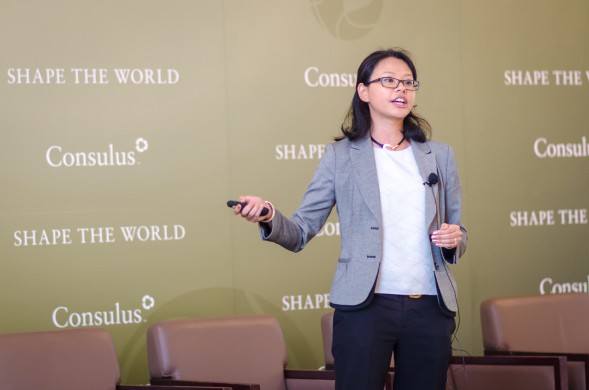
Ms Tang Ying Chun, Strategy Manager, Consulus, explains how company culture contributes to business performance.
Changing the conversation on culture
While Helena focused on leadership renewal and staff retention, Strategy Manager Tang Ying Chun focused on an ageless CEO conundrum, “Between fostering company culture and increasing sales, which do I choose first?”
The audience learnt that they could get round the problem by using culture to drive business performance.
“Linking core value practice to tangible business performance indicators would allow CEOs can foster culture and increase revenues at the same time,” Ms Tang mentioned while citing GE’s success in nurturing core values.
GE’s core values are implemented with clear examples in a handbook and reinforcing them through the culture. Sticking to integrity, one of their core values, have helped them grow their profits.
Should a company fail to practise core values, there will be high staff turnover by dissatisfied employees and productivity loss from an overt focus on central control. In these situations, people tend to work in silos and this separation causes companies to miss business opportunities.
The solution is to identify core values that the organisation wants to focus on and establish rituals that reinforce those core values. The example of Consulus Coach, a monthly activity that encourages learning and knowledge transfer within Consulus, focuses on encouraging professionalism in all staff by getting them to stay on the cutting edge of knowledge gathering and learning. This has cut down the time needed to induct a new employee from three months to just a week.
Spreading the word
One of the key objectives of every Shape the World Conference is to engage participants to bring back ideas and plans to implement in their offices. This year’s speakers and panel discussions have given them simple and effective solutions that they can easily disseminate and implement in their own companies.
It was clear that attendees realised that Asia’s brand of leadership was important in shaping the world.
“I like the idea that it is Asian-centric and Asian-focused, because somehow that seems to be missing in the conferences that we attend here and that’s what I really enjoyed most from this conference,” Renee Tan, GM at Singapore Repertory Theatre, said.
The speakers also found that the conference incited deeper thought into how Asia can rise to lead the world through a Creator Mentality.
“There were definitely a few thought-provoking questions, and we start to ask ourselves, ‘Do we just follow? Or do we be a leader?’ It’s definitely about creating and not just doing,” Mr Adrian Mok, MD of Hivelocity, said.
All attendees were also invited to the inaugural ConsulusCIRCLE, a gathering on 29 November 2012 that aims to build the movement of purpose-driven companies. This circle gathering acts as a support group for CEOs and professionals to share their experiences of finding purpose and implementing positive changes to their companies.

